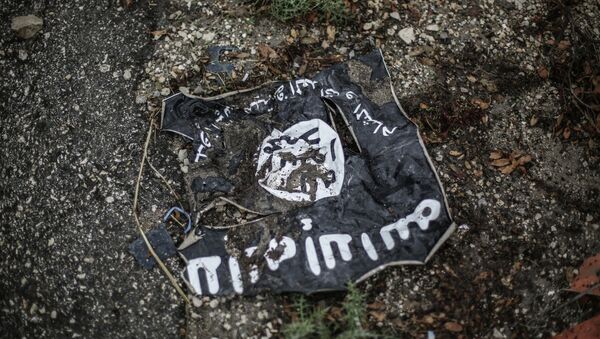MOSCOW, December 13 (Sputnik), Svetlana Alexandrova, Daria Chernyshova — Qatar was supporting a range of Islamists in Syria and Iraq from the Muslim Brotherhood to Salafi Jihadist groups along with Saudi Arabia and Kuwait, experts told Sputnik News Agency on Saturday commenting on the recent report of the US Foundation for Defense of Democracy (FDD) exposing Qatar's role in the extremist groups' financing.
"It was not just Qatar doing this, it was Kuwait via private donors and more importantly Saudi Arabia," a senior policy fellow with European Council on Foreign Relations Andrew Hammond told Sputnik News Agency adding that, "it was through private donors, though that money would have got to the jihadist groups."
Yevgeny Satanovsky, the president of Institute for Middle East Studies, believes that the inception and strengthening of Islamic State is, in fact, a story of clashes between extremist groups sponsored by Qatar against extremists financed by Saudi Arabia.
"Obviously, the Saudi and Qatari money channelling was done through private individuals," he said adding that, "Riyadh, that was proven to channel money to al-Qaeda and its clones, has never done it directly through the Central Intelligence Agency but through individuals."
Both experts agreed that the report prepared by FDD, that is considered to be a US neoconservative think tank, does not reveal new facts. Instead, it proves that the US State Department and the US Department of National Security long ago "turned a blind eye" on the Gulf states financing Islamic extremism.
"Pro-Israeli analysts and politicians in the United States and elsewhere are not interested in attacking Saudi Arabia over this year, so they focus all their energy on Qatar," Hammond said connecting this US policy with the fact that Qatar supported Hamas during the Gaza war this year while Saudis were against it.
"Indeed, [Saudi Arabia's ruling royal family] Saud have carefully manoeuvred themselves into a political alignment with Israel on a number of issues, and the same goes for the United Arab Emirates," he explained.
Hammond, who is also an author of the book "The Islamic Utopia: The Illusion of Reform in Saudi Arabia", believes that, "in the Saudi case the [financing] may have been orchestrated by senior princes directly, specifically by Bandar bin Sultan who was in charge of the Saudi campaign to bring down the Syrian president Bashar Assad."
Saudi Arabia, alongside other US allies such as Jordan, the United Arab Emirates, Qatar and Bahrain, that all have Sunni leaderships, were opponents of Assad, who is a member of a Shia Alawite sect, backed by Shia Iran. The Gulf states at first actively supported with money and weapons extremists fighting Assad but became alarmed after Islamic State (IS) proclaimed a caliphate on the part of the Iraqi and Syrian territory.
"ISIS [IS] will continue to grow territorially until it falls apart, if Sunni tribes along with Baathists led by Izadam Ibrahim Adduri organize successful raids behind the Islamic State's lines," Satanovsky told Sputnik adding that Saudi Arabia might fall under the IS pressure. He pointed our that Riyadh already takes additional security measures.
"The Kingdom [of Saudi Arabia] strengthened the Iraqi border with the National Guards and signed an agreement of military alliance with Egypt, that allowed Saudis to add another 30,000 soldiers from the Egyptian Expeditionary Force," the expert said noting that Saudi Arabia is also trying to "buy" the tribal sheikhs who live on the Saudi-Iraqi border.
Speaking of Qatar, Satanovsky stressed that, "these days the state also channels money to Imarat Kavkaz [a militant group operating in North Caucasus]."
The expert is confident that this group organized the terrorist attack in Grozny city in Russia’s North Caucasus republic of Chechnya on December 4 when Russian President Vladimir Putin delivered the annual Presidential Address to the Federal Assembly.
Imarat Kavkaz is an Islamic extremist organization that has been fighting government forces in its campaign to establish an Islamist state across Russia's North Caucasus.

